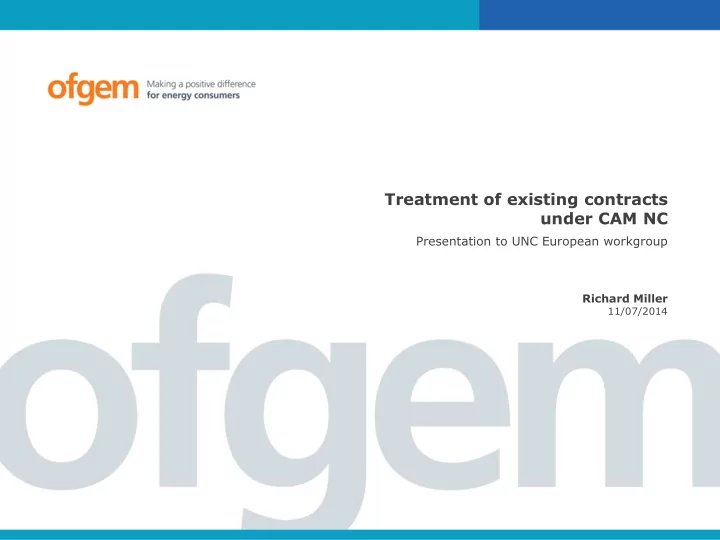

Treatment of existing contracts under CAM NC Presentation to UNC European workgroup Richard Miller 11/07/2014
The issue • CAM is required to be implemented by 1 November 2015. • Shippers have bought entry capacity at Bacton for use after this date. • This entry capacity was bought with the proviso that there was no need to determine the route through which gas flows into GB at Bacton. • As a consequence of CAM, Ofgem are minded to split the Bacton ASEP into two new ASEPs (link to our consultation here). – Bacton UKCS and Bacton IP • If approved, UNC modification 0501 will mean that shippers need to assign any entry capacity booked post November 2015 to one (or across both) of the new ASEPs. • Some shippers have said this is a material change in the product they originally bought and they should be provided with an opportunity to terminate existing NTS entry capacity contracts at Bacton. 2
Treatment of existing contracts • CAM applies to existing contracts (Article 20, CAM NC). • The UNC is a multilateral contract, to which Transporters and Users (inc. Shippers) are parties. – UNC ¡Introduction, ¡“The ¡Uniform ¡Network ¡Code ¡comprises...the ¡Transportation ¡Principal ¡Document, ¡which ¡ sets ¡out ¡transportation ¡arrangements ¡between ¡Transporters ¡and ¡Users” – UNC ¡Introduction, ¡“...the ¡Uniform ¡Network ¡Code ¡is ¡to ¡be ¡incorporated ¡into ¡each ¡Transporter's ¡Network ¡ Code...[and]... Each Transporter's Network Code is made binding between the relevant Transporter and Shipper ¡Users ¡pursuant ¡to ¡the ¡relevant ¡Shippers ¡Framework ¡Agreement” • The Authority makes decisions on modification proposals to the UNC but is not a party to it. • The effect of CAM on existing contracts and whether they can be terminated will depend on a number of factors including the specific terms of the UNC and any other contracts between the parties, contract law for the relevant jurisdiction that they operate under and the respective positions of parties to them. – Parties should therefore seek their own independent legal advice on their rights and obligations in respect of their own contracts. • Parties to the UNC are free to raise modifications, including in respect of capacity already purchased. – The Authority considers any UNC modification proposal that comes to it for decision against the relevant objectives of the UNC and its wider statutory duties. – For the avoidance of doubt, the Authority has no intention at present to raise a modification under the powers given to it through mod 0448 3
Stakeholder input • All UNC modifications change the terms of the contract between transporters and shippers to a greater or lesser extent – but existing bookings and obligations are not renegotiated each time. • We are inviting shippers to indicate how they might choose to assign capacity following a split as part of our consultation. – This will indicate whether our proposed split is appropriate and mitigate the risk of stranding capacity. • We have not received any further evidence of how shippers actively use capacity bookings at Bacton interchangeably. – We remain open to discussing this and have previously given industry the opportunity to discuss how flexibility can be maintained. – However we remind industry that the timeframe for implementation in time for 1 November 2015 of such an option is tight • We invite industry to share the detail of any other views on this issue either in their consultation response, bi-laterally or at industry working groups. 4
Recommend
More recommend